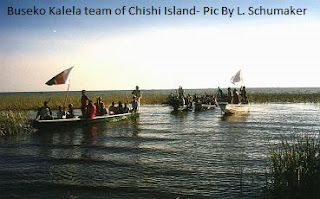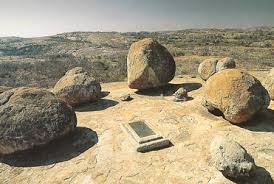THE UNSUNG MYSTERIES OF SAMFYA TOWN As we were about to approach Samfya, Richard gave me a push so I can wake up and see an “endless mass of water.” He was coming to Samfya in Luapula province of Zambia for the first time. I have been here on many occasions but not visited some interesting places. The white sugar sand dune on which the car perched before slopping down to the beautiful beach revealed an aura of warm fresh air and made the sky look bare as if the clouds were just evaporating from the water. We were about to have a panorama of a memorable picturesque of the lake from a vintage point. We were looking at Lake Bangweulu! As we approached the shore, we saw a wonderfully built, artistic, grass - thatched chalets on the upper boulder of the beach that complemented the beauty of the white sandy beach. “Does this lake really end somewhere? I can only see clouds touching the lake?” Richard asked amazingly. “Yes, it does. The no-end view portrayed by the lake from afa
Posts
Listen On
BOOK IN OFFING
- Get link
- Other Apps

COMING SOON! THE UNGA TRIBE OF BANGWEULU SWAMPS- MORE THAN JUST FISHERMEN CONTENTS CHAPTER 1: Origins and the founding of Lunga CHAPTER 2: Chieftaincy and Succession Lineage CHAPTER 3: Language, Culture and Tradition CHAPTER 4: Fishing, Hunting as main occupation CHAPTER 5: Wildlife, Traditional Ceremony & Tourism CHAPTER 6: Food and Nutrition CHAPTER 7: Social and Pastime activities CHAPTER 8: Death and Superstition CHAPTER 9: Politics and Development CHAPTER 10: Unique Words, Adages and Idioms ____________________________________________ CHAPTER 1 INTRODUCTION Within Bangweulu Wetlands lies a vast 5,000 km 2 swampy area called Lunga, which is home to over 50,000 indigenous Unga tribesmen. The name Lunga simply means to hunt and was derived from the area’s suitability for hunting expeditions because of its abundant wildlife. Located in Luapula province north-east of Zambia, Lunga is a cluster of islands and islets
LET'S DANCE KALELA
- Get link
- Other Apps

Picture by Lyn Schumaker Kalela is a spectacular type of group dance which is only practised by the people of Luapula province of Zambia. However, the Unga tribe of Bangweulu swamps treasure this type of entertainment whenever it takes place. The competition is usually between two teams from different tribes or habitats. A competing team will typically comprise 15 to 20 members, male and female , aged between 20 and 60. The composition will include drummers and dancers. All members must participate and must be good at singing and dancing. A golden voice would earn one a crucial role in the team. Each team is led by a "King", pronounced as "Chinji" in the local language. The Chinji is basically the group's lead singer who also assumes the role of composer and director. He is the leading man to watch because he determines the failure or success of his team. He is assisted by one or two teammates who will be in charge of training others in m
SHOCKING VOICE FROM THE GRAVE
- Get link
- Other Apps

The richest man in the family had just died. Every relative wanted to have a share of his wealth. The late Mulimbule was just marvelously gifted and accumulated a lot of wealth. He looked after workers and kin very well. The village was about to conclude an elaborate funeral process at a traditional meeting locally called Isambwe Lya Mfwa . This is the climax of any funeral in the village. It’s here that the family considers and distributes the deceased’s estate. The eldest paternal uncle chaired the meeting. Mulembwe indicated the meeting would not be prolonged because people had been spending nights in the cold for the previous five days. They needed to settle the question of inheritance quickly. They confirmed his nuclear family comprising eight official wives, nine concubines and 39 children. Only 11 children were recognized by his extended family. The rest lived with their mothers away from his home in Chumbwe. The 28-strong team of adolescents had bee
BOCHOO!
- Get link
- Other Apps

IT’S TASTY! IT’S CALLED BOCHOO! Imagine you are travelling for about eight hours. If you are travelling by private car or public bus, you make stops at takeaway outlets and buy your refreshments. If you are travelling by air, an air hostess will wake you to some warm munchies that may include fresh juices. This is because your body demands to be nourished for renewed energy and keep healthy. So it is with us travelling to Ungland . When we have been paddling a laden boat or canoe over a distance of more than 30 kilometers, we stop to fill the tanks. We fix some original and real fast food! The difference is that our fastest meal will be complemented with delicious stuff known as Bochoo . It is indeed some quick delicacy that should not take a lot of time. The meal is better taken while it is hot. The other difference with what you pals consume on the plane, your car or bus is that we cook our own while you get it ready-made. Here is how accomplished Unga sous-ch
TOURISM COULD BE LUNGA'S ECONOMIC BEDROCK
- Get link
- Other Apps
Watching school pupils on our national television learning under a mango tree at Matipa Primary School in Lunga and seeing them being taught by a volunteer school leaver left me with a huge lump in the throat. May be this is better left to competent administrators to contemplate. I remembered an argument I had with one foreign researcher last year. The young researcher based in Lunga once doubted that there would be little or no meaningful development that could take place on these islands. He argued that the geographical location, seasonal flooding and remoteness made it difficult for any meaningful investment. As we say in my language,” uwikwite atila ubwali ubo kateule, ” meaning when you are full, you discount the urgency of serving a meal. The world is focusing on the tourism industry today. Zambia’s marketing language is all about attracting tourists. It’s the hot topic in many circles considering economic improvement. Question is; what do tourists
NJELELE
- Get link
- Other Apps

LUNGA’S BURIAL SITE FOR THE BLAMELESS! "The secret behind the respect accorded to sacred areas and their environs lie in the taboos that are associated with them," so they say. In Lunga, Njelele is one such place! It is a tiny Island that looks desolate but with a strong cultural attachment to the beliefs of the Unga people. In 1974 when my mother died at Mukanga village in Chief Bwalya Mponda of Ncheta Island, one of my uncles firmly suggested that she be buried at Njelele, 40 kilometers away in Nsamba chiefdom. Uncle Chalwe was convinced that if his sister’s death was caused by someone within the village, she would come to haunt the killer’s family until they were identified. Secondly, if the killer tried to stop her by going to her grave and frustrate her vengeance strategies, s/he will be harmed by all the innocent souls buried at Njelele. It was undoubtedly believed that only guiltless people who never practiced witchcraft and other vic
 SoundCloud
SoundCloud